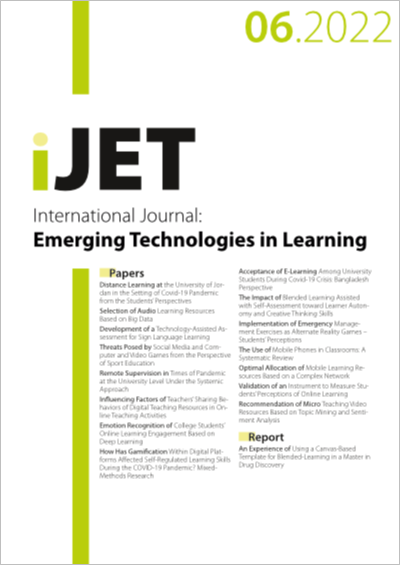Acceptance of E-Learning Among University Students During Covid-19 Crisis: Bangladesh Perspective
DOI:
https://doi.org/10.3991/ijet.v17i06.28033Keywords:
E-learning, Acceptance, Satisfaction, COVID-19, Technology Acceptance Model (TAM), Developing countryAbstract
COVID-19 pandemic has dramatically transformed the global education system to a great extent. In a short period, e-learning has been adopted globally as an al-ternative teaching-learning medium. However, this sudden transition raises many concerns about e-learning acceptability. To make a clear inference, this study investigated the acceptance of e-learning (perceived usefulness, and perceived ease of use) among university-level students using the Technology Acceptance Model (TAM). The empirical analysis was performed on a sample of 694 university students in Bangladesh during the COVID-19 crisis. Findings revealed that students' overall e-learning acceptability was not adequate (32.8%), a significant number of students (46.8%) were not satisfied with e-learning experience and that majority (70.2%) of students preferred face-to-face education systems for their future study. The study also highlighted the underlying factors that negatively affect students' e-learning acceptance such as lack of technological skills, less familiarity with e-learning, lack of simplicity, low productivity, inefficiency, and so on. The overall findings of this study are intended to assist stakeholders to understand the gaps that need to be addressed immediately to increase students ’e-learning acceptability in the future.
Downloads
Published
2022-03-29
How to Cite
Tamal, M. A., Sarker, M. F. H., Islam, M. K., & Hossain, M. E. (2022). Acceptance of E-Learning Among University Students During Covid-19 Crisis: Bangladesh Perspective. International Journal of Emerging Technologies in Learning (iJET), 17(06), pp. 152–162. https://doi.org/10.3991/ijet.v17i06.28033
Issue
Section
Papers
License
Copyright (c) 2022 Maruf Ahmed Tamal, Md Fouad Hossain Sarker, Md Kabirul Islam, Mohamed Emran Hossain

This work is licensed under a Creative Commons Attribution 4.0 International License.



